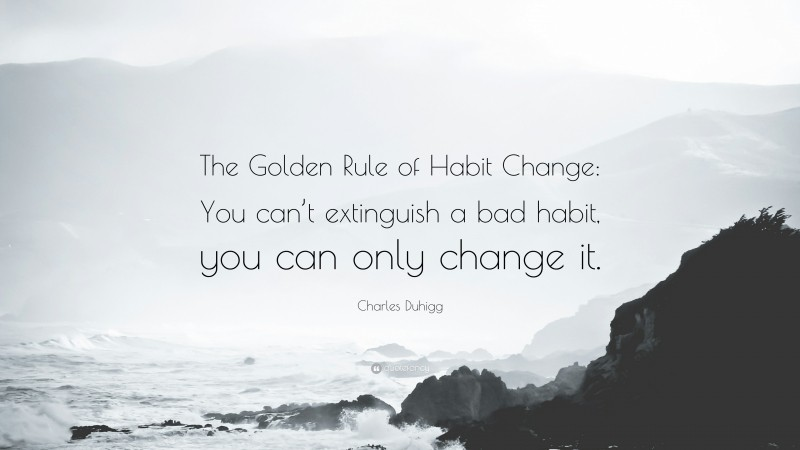The Power of Habit is a book by Charles Duhigg, which discusses that human behavior is based on and built on habits. He established that you do not need to overwork and exhaust yourself in order to get tasks done, rather you can put yourself into good routines and throw away destructive habits. Charles Duhigg provides an understanding of how to help change and break any habit and to develop it into automatic behaviors. There are three parts that make up the entirety of this book, The Habits of Individuals, The Habits of Successful Organizations, and The Habits of Societies.
The argument Charles Duhigg portrays in his book is that you do not actually think about habits, they are just unconscious decisions you make. A specific statistic stuck out to me during my read of this book by Duhigg, "more than 40% of your daily behaviors are driven by habits that you automatically engage in without conscious thought." These specific habits affect how you think and what you do, along with how your health, relationships, productivity, and even happiness play out. Duhigg explains the reasoning behind the development and formation of automatic behaviors and why your brain processes information about how to function. A large portion of mental energy is taken away from you when you have to apply conscious efforts to learn something new.
The first part of The Power of Habit starts off with a case study on a man who was majorly affected by a viral encephalitis case. The severity of this man's case soon interested other researchers due to him being able to form new habits slowly despite him not being able to hold memories due to brain damage. As Duhigg wrote, habits "emerge without our permission," and I believe that is why they are so hard to break. The second part of The Power of Habit portrays the argument that people fail habit change due to their reasoning of not understanding how habits change them. People often assume that using their own willpower will take away their habits. Due to specific elements that fuel habits, willpower needs to be stronger and will end up being ineffective. We learned about rewards in PowerPoint #2 and how they affect us, and that shows a connection with habits. The habits we unintentionally form often lead to a craving, which can be the reward anticipation. When people know there are rewards, they continuously perform these habits which makes it hard to ignore the side effects and negative mental effects that come with them. Part three of the book concludes with a discussion of the Golden Rule of habit change. This rule states that you should keep the same cue and reward, but the routine needs to change, you have to replace old habits with new ones. Although we can never fully throw away our habits, there is the possibility for change and more development.
The whole concept of the book is something that everyone deserves to read. It explains why habits can be a danger to us and lead a pathway to an unhealthy lifestyle. My favorite concept I read in The Power of Habit was the Golden Rule of habit change. It explains how you can keep the old cue and the same outcome or reward, but a new routine should be inserted. It is so difficult to alter your lifestyle and throw away habits, but changing the way you approach it and deal with it can lead you to a positive outcome. You do not have to be extraordinary to achieve what you want. I believe it is important to understand the process of habit change because it also opens a window of understanding oneself and learning determination.
5 Steps to Change a Habit
1. Identify the cue.
2. Identify the reward you crave for.
3. Identify the routine you do to get the reward.
4. Change the routine when you get the cue so that you get the same reward.
5. Believe that you can change your habits and that things can get better. Belief is easier when it occurs within a community" (Sampath, 2013).
The PowerPoints covering rewards and impulsivity/self-control allowed me to understand habits more easily throughout the reading of The Power of Habit. It is common to see that people who are able to have a good sense of self-control can lead themselves into having good habits. These types of people do not end up struggling or falling into a state of denial because their behavior is automated by good habits. Some may argue that rewards are not important in life, but that is not always true. Rewards can help with building healthy habits and can force us to engage in healthy behaviors. If you are using rewards as a motivation tool, there needs to be an understanding that rewards need to align with the values we have, not take over our goals.
Hacking Your Brain’s “Reward System” to Change Habits - YouTube
Reference
Sampath, P. by Venkata S. (2013, February 15). The Golden Rule of habit change: Why transformation occurs. The Tao Of Wealth. https://thetaoofwealth.wordpress.com/2013/02/18/the-golden-rule-of-habit-change-why-transformation-occurs/#:~:text=So%20if%20you%20want%20to%20change%20a%20habit%3A,easier%20when%20it%20occurs%20within%20a%20community.%20

Hi, Abby. We read the same book...this whole book really intrigued me.The Golden Rule of Habit Change is something I'm really going to think about and apply to my life moving foreward.
ReplyDelete